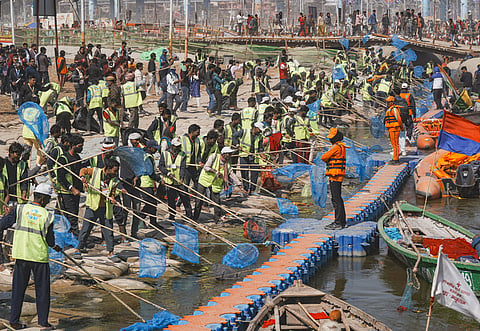

NEW DELHI: The Ministry of Housing and Urban Affairs (Mohua) has tied up with institutions of international repute to study waste management and delivery of urban services at the ongoing Maha Kumbh, where the footfall has already crossed the 50-crore mark.
The aim of the research is to understand and highlight the impact of innovative measures, sanitation strategies and administrative arrangements for maintaining cleanliness.
The list of institutions includes Harvard Business School, Institute for Competitiveness – Stanford University, International Finance Corporation, MicroSave, Gates Foundation, Indian School of Business, IIM-Indore, IPSOS Research Private Limited, and National Institute of Urban Affairs.
According to officials, the largest congregation at the confluence of the Ganga, Yamuna, and Saraswati rivers is an opportunity to record and analyse the achievements made under the Swachh Bharat Mission (SBM) launched in 2014.
“After a decade of SBM’s transformative impact, the Maha Kumbh serves as a testament to the nation’s progress in fostering a cleaner and sustainable urban environment. Engaging noted institutions is to document and examine the achievements methodically. As a part of the survey, the teams are conducting activities such as observation and documentation of sanitation and solid waste infra,” said officials.
The surveying groups are also holding interactions with service providers and other stakeholders to assess experience and gather feedback from the locals and devotees.
As per the data released by the Uttar Pradesh government, 50 crore people have already visited the Maha Kumbh turning into the largest congregation in mankind for any religious, cultural, or social event. The 45-day festival will conclude on February 26.
The ministry recently requested the UP urban development department to grant “necessary” permissions to conduct studies and gather data.
Harvard Business School is conducting research on subjects such as food and beverage management, operations of the event, inter-city connectivity, multimodal transport hubs, and public transport systems. The scope of the study includes review of governance frameworks and proposing models for urban development.
Stanford University is examining solid and waste management efficiency and waste disposal mechanisms. It will study potable and non-potable water distribution and accessibility.
IIM-Indore will check interventions related to behaviour change, IEC (Information, Education, and Communication), and advocacy in sanitation. IPSOS is undertaking a sanitation assessment; evaluation of solid and liquid waste management systems. IFC-Gates Foundation is observing socio-economic impact in six districts; Prayagraj and adjoining areas including Varanasi and Ayodhya.